
From the Website of CNN NEWS
links: https://edition.cnn.com/2019/06/19/health/chinese-modern-medicine-cancer-hong-kong-intl/index.html
(CNN)Karen Kwai-Ching Li, known as KC, has lived in fear of her osteosarcoma, a cancer of the bone, for almost 28 years.
She was diagnosed in 1991, at the age of 10, but failed medication over two months resulted in her tumors spreading, leading to an amputation of her leg. After the surgery and six rounds of chemotherapy, she went into remission.
Using her prosthetic leg to get around, she continues to see Dr. Godfrey Chan, a pediatric oncologist at Queen Mary Hospital in Hong Kong, to monitor her recovery and ensure that the cancer doesn't return.
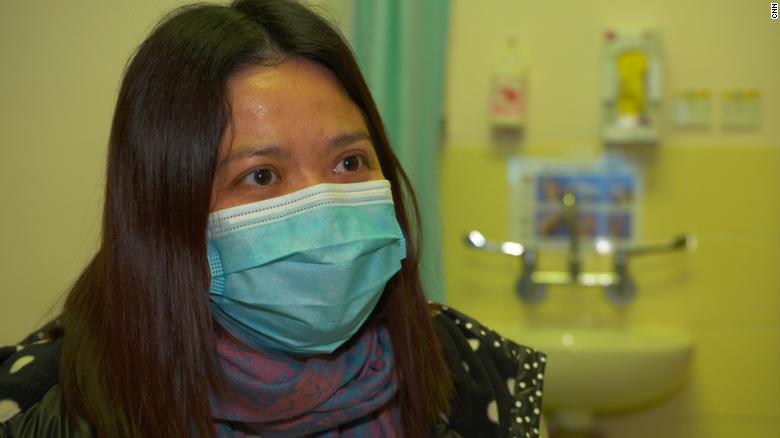
KC, a cancer patient at Queen Mary hospital, Hong Kong
"My condition has been pretty stable," she said.
To get through her treatment and the range of side effects of chemotherapy, KC turned to a seemingly contrasting practice: traditional Chinese medicine.
Each time she had chemotherapy, her body seemed weak, she said. Friends and family recommended the plant root ginseng, whose benefits are believed to include boosting energy, with recent studies supporting that claim.
When her family prepared ginseng for her to drink, she felt "more energized and regained a little more strength," she explained, which led her to use it after each chemotherapy session.
But she took it with Chan's blessing -- because Chan is not your typical oncologist. Though Chan practices modern Western medicine, his father was a practitioner of traditional Chinese medicine. After a childhood surrounded by herbs and remedies, he's bringing the two together to explore the clinical value of herbal medicine.
His family history gives him an edge, helping him bridge a medical divide to the benefit of patients like KC, particularly in the cultural melting pot that is Hong Kong.
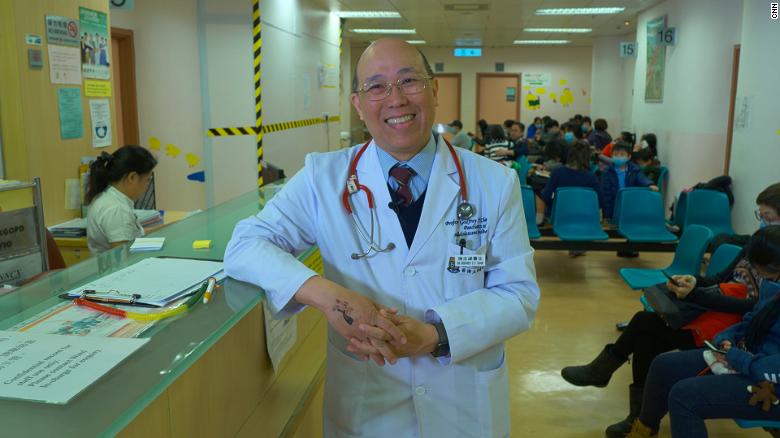
Dr. Godfrey Chan of Queen Mary Hospital in Hong Kong.
Advantages and complications
"It's like a treasure mine," Chan said. "We already have a lot of information from history that we know that some of this formula works [and] some of this formula does not work."
By exploring the active ingredients of thousands of items used in Chinese medicine, Chan believes, he could find treatment combinations to help patients heal faster.
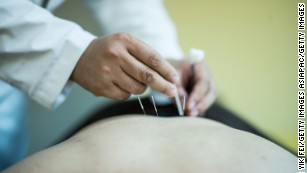 |
New law sparks debate over future of traditional Chinese medicine |
"We look at traditional Chinese medicine in a more holistic way," he said.
But such a merger requires due diligence to make sure the herbs complement, rather than confound or harm, any modern treatment -- particularly with something as sensitive as cancer treatment.
"We have to be very careful, because other than advantages, we can also deal with complications," Chan said.
One example, he explained, is lingzhi, a Chinese mushroom taken by many of his cancer patients, with guidance and supervision. They believe that it can enhance immune function. However, for patients with cancers of the immune system, such as leukemia, use of such an herb could help the cancer proliferate. Here, "it's probably not wise," he said.
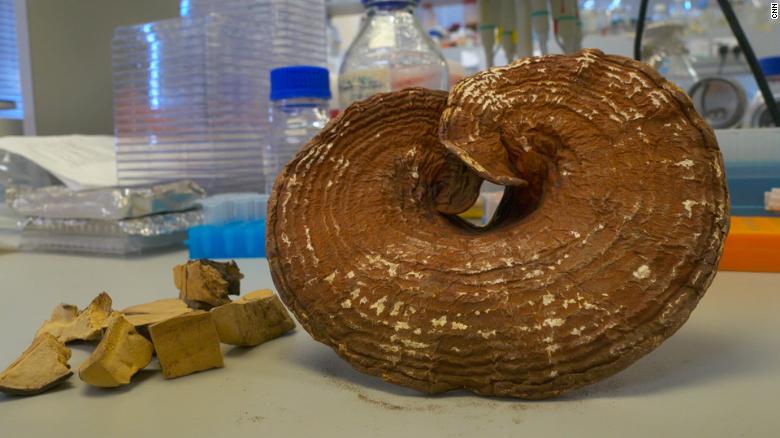
The lingzhi mushroom is believed to help immune function.
For KC, the outcome of two therapies was better than one, she said, and she believes "the integration of two therapies to be a future trend in Hong Kong," and more globally.
Investment in the future
Chan is also trying to provide evidence for the combining of Eastern and Western medicine because, he said, people are already doing so without knowing the true benefits -- or the possible harms.
In the 1990s, he said, a study he conducted revealed that almost half of his patients were taking Chinese medicine in combination with their cancer treatment. This fueled his desire to be able to inform them.
"Some of them actually discussed [using both] with me," he said. "But most of them, they don't. They didn't bother to tell me."
The government has since provided funding and resources for greater research into Chinese medicinal herbs, he explained, building hospitals and clinics for the University of Hong Kong school of medicine and ensuring greater quality control.
"I think there will be more chances for integration in the future," Chan said.
Modern targeted treatment versus holistic history
What is now known as Chinese medicine has been practiced for 3,000 years or more, explained Lao Li Xing, director of the school of Chinese medicine at Hong Kong University.
Lao trains Hong Kong's next generation of practitioners of traditional Chinese medicine and believes that the ancient practice can fill the gaps and overcome some of the limitations of Western medicine, such as cancer and the side effects of treatment.
Radiation therapy and chemotherapy are crucial but often have problematic side effects, he told CNN from his clinic, where a large wall features hundreds of drawers, each filled with a unique herb or ingredient.
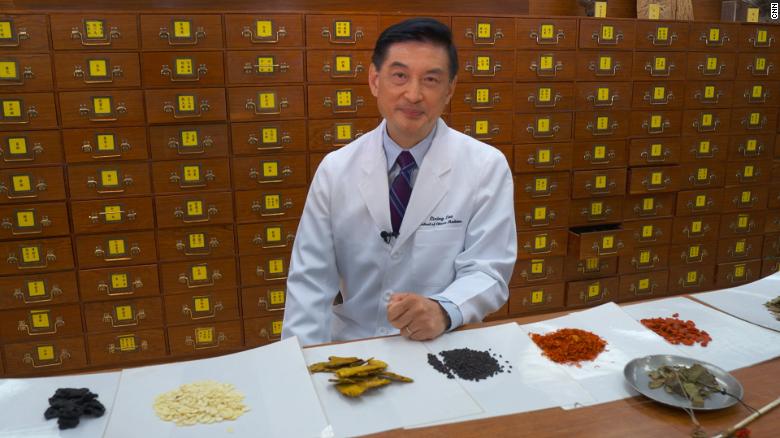
Lao Li Xing, director of the University of Hong Kong School of Chinese Medicine.
"Insomnia, nausea, vomiting; sometimes they have dry mouth from the radiation therapy," he said. "Chinese medicine really can play a bigger role to help their quality of life."
The traditional practice itself has four stages of diagnosis: observation, tongue analysis, listening to a patient's thoughts and analyzing their pulse, Lao said.
"Personal experience is very important. We feel the pulse, look at the tongue and make a decision individually," he said, using the analogy of a suit to describe the experience as going to a tailor rather than a store.
But "both Western medicine and Chinese medicine together," will get a patient back to good health, he said.
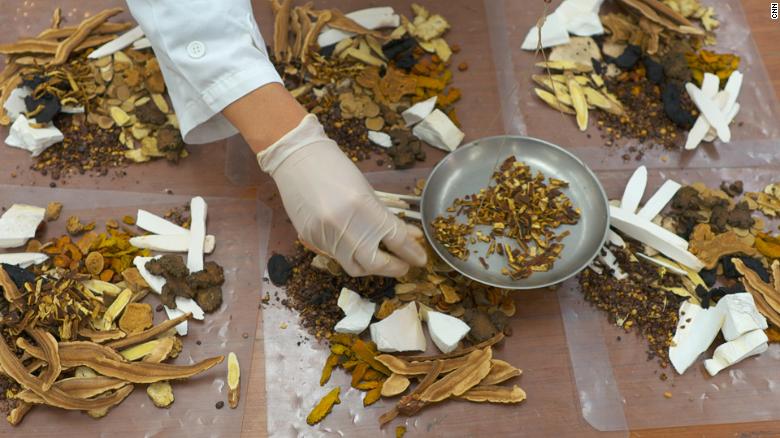
Selection of traditional Chinese medicines in their raw form.
Qihe Xu, co-director of the King's Centre for Integrative Chinese Medicine in the UK, agrees.
"The value of Chinese Medicine lies in its different means for diagnosis and intervention, emphasizing nurturing health, preventing disease, defending capacity in health and disease, and function-oriented wellbeing of a person as a whole," he wrote in an email.
"Too often Chinese medicine offers alternative solutions where conventional medicine fails. Thus, integrating the wisdom and approaches of both TCM and conventional medicine represents a shortcut to meet many unmet medical needs," he said.
Acupuncture works, one way or another
Xu gave the example of work by Professor Tommy Yung-Chi Cheng at Yale University, whose 2012 studyfound that four herbs used in traditional Chinese medicine for more than 1,800 years to treat gastrointestinal issues were effective at "alleviating side effects, but also enhances the efficacy, of chemotherapy," he said.
"Further research in this area promises to transform tomorrow's medicine."
'Conditioning the body'
Cheung Yiu-kai, 66, was recently treated for liver cancer using a combination of surgery and electrotherapy -- in which electric currents are applied to tumors -- at Queen Mary Hospital to remove a series of tumors.
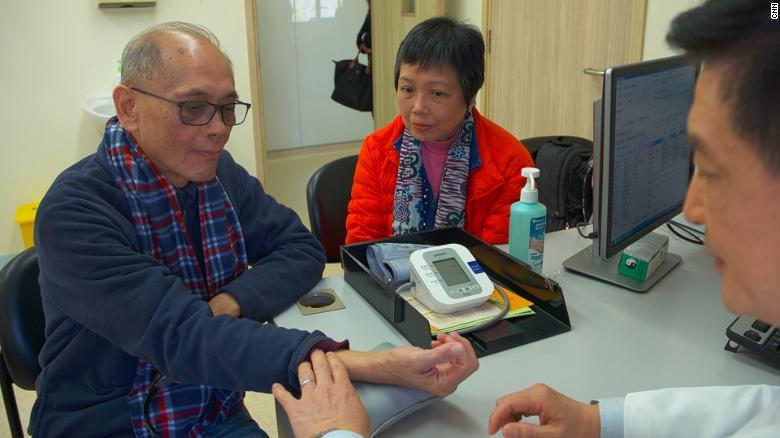
Cheung Yiu-Kai, a patient at Hong Kong's School of Chinese Medicine
After his Western treatment, he sought help from Lao's team at the School of Chinese Medicine to restore his overall health.
Cheung explained that while a Western doctor investigates what's going on inside his body, a Chinese medicine practitioner conditions the body as a whole, unable to see what's causing a problem specifically -- highlighting the need for a combination and not solely Chinese remedies.
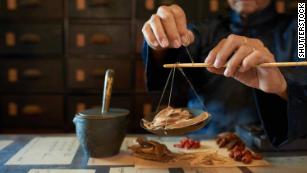 |
Chinese medicine gains WHO acceptance but it has many critics |
While the partnership of old and new is in its infancy, both Chan and Lao believe the pairing fits the way medicine and health care are going.
In 2019, the World Health Organization added traditional Chinese medicine in its International Statistical Classification of Diseases and Related Health Problems, a global health compendium identifying health trends and statistics and the international standard for reporting diseases and health conditions.
The previous year, the Chinese government required local governments to launch traditional Chinese medicine institutions in all medical centers, increasing funding for its development and widening the scale of education.
A series of studies have proved the potential benefits of acupuncture in treating migraines,allergies and pain.
Get CNN Health's weekly newsletter
Sign up here to get The Results Are In with Dr. Sanjay Gupta every Tuesday from the CNN Health team.
Chan believes his research is further validating the trend, aided by his prime location in Hong Kong, "a city that can merge the Western and Eastern culture," he said. "This is our main strength in merging the information not only in culture but also in the applied science."
Western physicians and Chinese medicine practitioners in Hong Kong can together demonstrate that this is the best system for patients, Lao believes, resulting in care that is more effective, with fewer side effects.
"This can be the model for the entire world."
CNN Website
Article Links
OTHER HUMAN RIGHTS PROMOTIONS WEBSITES
------------------------------------------------------------------------------------------------
THE GLOBAL WORLD PROMOTIONS
-------------------------------------------------------------------------------------------------
-------------------------------------------------------------------------------
---------------------------------------------------




































0 comments:
Post a Comment